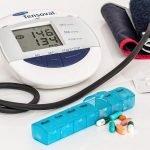This common depression drug may help prevent severe COVID-19
In a new study from McMaster University, researchers found an inexpensive antidepressant reduced the need for hospitalization among high-risk people with COVID-19.
They tested the...
Walking may reduce depression after giving birth
The COVID-19 pandemic has meant countless women are looking beyond harder-to-access, traditional postpartum depression (PPD) treatment options—like psychiatry and medication—and finding that physical activity...
Common depression drugs plus pain killers may increase gut bleeding
In a new study from Creighton University, researchers found taking common painkillers alongside antidepressants called selective serotonin reuptake inhibitors (SSRIs) may raise the chances...
A new way to help people with depression find the best drug
Although antidepressants are one of the most frequently taken medications in the United States (11% of the population takes antidepressants) 60% of depressed patients...
This beverage may cut depression in older people
In a new study from the National University of Singapore Sociology, researchers found there’s an association between consistent and frequent tea drinking and strongly...
These blood pressure drugs may help reduce depression
In a recent study published in Hypertension, researchers found none of the 41 most common high blood pressure medications increased the risk of depression, while...
This common depression drug could treat the leading cause of blindness
In a new study from the University of Virginia, researchers found an antidepressant best known as Prozac could offer the first treatment for the leading cause...
‘Laughing gas’ can reduce severe depression quickly
In a new study from the University of Chicago, researchers found a single inhalation session with 25% nitrous oxide gas can rapidly relieve symptoms...
These drugs for depression may come with higher death risk
In a recent study from Rutgers University, researchers found adults with depression who added newer antipsychotic medications to their treatment had an increased mortality...
Drugs may treat depression better in these people
In a new study published in the Annals of Family Medicine, researchers found that antidepressants may be more effective than exercise for seniors with...










